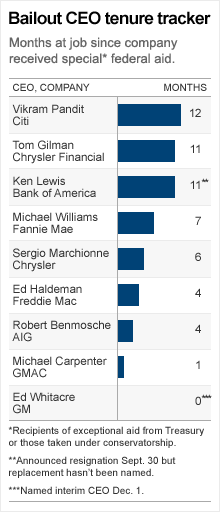Turnover trouble hits Obama Inc.
GM's latest shakeup shows that executive suite churn is part of the new normal for bailed-out companies.

NEW YORK (Fortune) -- The captains of bailed-out companies can't seem to stop bailing out.
General Motors chief Fritz Henderson resigned Tuesday under pressure from the troubled automaker's board. Henderson, a 25-year GM veteran, had taken over for Rick Wagoner just eight months ago.
Henderson is just the latest CEO of a federally backed company to hand back the reins within months of taking them.
In all, the nine firms in which the government has taken a significant stake - General Motors, Chrysler, GMAC, Chrysler Financial, AIG (AIG, Fortune 500), Citigroup, Bank of America, Fannie Mae (FNM, Fortune 500) and Freddie Mac (FRE, Fortune 500) - have had 20 permanent or interim CEOs in the 15 months since the feds started propping them up.
Four of those firms - GM, Fannie, Freddie and AIG - have changed leadership at least twice since the government poured billions of dollars into their operations starting last fall.
And just two CEOs remain from the glorious old pre-bailout days.
One of the survivors, against all odds, is Citi's (C, Fortune 500) Vikram Pandit, who has presided over an $80 billion decline in the bank's market value. The other is Tom Gilman of Chrysler Financial, the auto lender that is being liquidated under federal supervision.
What's behind all the churn?
Observers say a weak economy, newly assertive boards and the ever-declining popularity of bailouts complicate the task of reinvigorating companies that in many cases have been mismanaged for years.
"CEO candidates say to themselves, 'I want to leave my footprints on the sands of time,' " said C. Warren Neel, who runs the corporate governance center at the University of Tennessee in Knoxville. "The chemistry needs to be supportive of the CEO-board relationship, and I'm not sure that's the case right now at a lot of these companies."
Henderson certainly isn't the first leader to be pushed out by newly vigilant directors.
Just two weeks ago, the board at GMAC, the troubled cars-and-houses lender that has received $13 billion in Treasury loans, replaced CEO Alvaro de Molina with board member Michael Carpenter.
Though GM's board could have saved some face by hiring someone other than Henderson eight months ago, at least it has shed its passive ways, said management consultant Peter Cohan in Marlborough, Mass.
"Wagoner, the previous guy, ran the thing into the ground for years and they never did anything at all," said Cohan. "How much value did it have to lose for them to act?"
Indeed, the ouster of underperforming execs could point the way to better governance across corporate America.
"Now is the time for the boards to step up," said Eric J. Pan, who runs the Samuel and Ronnie Heyman Center on Corporate Governance at the Benjamin N. Cardozo School of Law in New York. "Turnover in itself isn't a bad thing as long as the government isn't making business decisions."
Still, it's anyone's guess how much success GM will have in filling Henderson's post.
At Bank of America (BAC, Fortune 500), another recipient of massive federal aid, longtime CEO Ken Lewis stunned Wall Street two months ago by announcing his departure without a successor in place. BofA's board initially planned to have the job filled by Thanksgiving, but for now it remains open.
That leaves the nation's biggest bank by assets rudderless at a time when the economy remains weak and the financial markets are still turbulent.
Given noxious bailout politics and the problems facing the banking and auto industries, the question is, who exactly wants to run these companies?
An unhappy answer may lie in the choices by two other taxpayer-funded outfits that have named new chiefs in the past three months.
While Carpenter, the new guy at GMAC, has the turnaround experience to make the best of a bad situation, not everyone has been wowed by the other recent hiring - AIG chief Robert Benmosche.
Since being named in August to replace Ed Liddy, Benmosche has been heard telling Congress to stuff it and complaining about red tape that surely was apparent before he signed on.
Such is life for boards charged with recruiting executives to run companies under intense pressure and unusual scrutiny.
"For these guys, it's mostly about ego, not money," said Cohan. "Still, you look at Benmosche and say, why bring that guy in?" ![]()
-
 The retail giant tops the Fortune 500 for the second year in a row. Who else made the list? More
The retail giant tops the Fortune 500 for the second year in a row. Who else made the list? More -
 This group of companies is all about social networking to connect with their customers. More
This group of companies is all about social networking to connect with their customers. More -
 The fight over the cholesterol medication is keeping a generic version from hitting the market. More
The fight over the cholesterol medication is keeping a generic version from hitting the market. More -
 Bin Laden may be dead, but the terrorist group he led doesn't need his money. More
Bin Laden may be dead, but the terrorist group he led doesn't need his money. More -
 U.S. real estate might be a mess, but in other parts of the world, home prices are jumping. More
U.S. real estate might be a mess, but in other parts of the world, home prices are jumping. More -
 Libya's output is a fraction of global production, but it's crucial to the nation's economy. More
Libya's output is a fraction of global production, but it's crucial to the nation's economy. More -
 Once rates start to rise, things could get ugly fast for our neighbors to the north. More
Once rates start to rise, things could get ugly fast for our neighbors to the north. More







